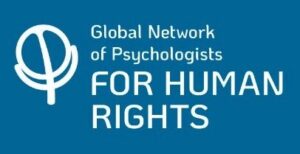
Editor’s Note:
The GNPHR Bulletin focuses each month on a specific topic chosen in accordance with relevant UN events or UN commemorative days for that month. The March theme coincides with International Women’s Day 2022: “Gender equality today for a sustainable tomorrow”
Special section editor for the Stories/Interviews for International Women’s Day is Marlena Plavšić, Croatia, GNPHR Steering Committee Member.
Table of Contents
Special Section: INTERNATIONAL WOMEN’S DAY, March 8
- Voices from Colleagues – Interview with Colleagues
- Related Articles
CONTENT AREAS: ARTICLES AND NEWS
- Children
- Climate Change
- Covid-19
- Crimes against humanity
- Data Rights
- Disabilities Rights
- Human rights education
- Inclusion, Exclusion, Racism
- Migration, Refugees, Displacement, Statelessness
INTERNATIONAL HUMAN RIGHTS NEWS
PUBLICATIONS
Bulletin End Notes
GNPHR NEWS
Webinar Series – Human Rights and Psychology
Next Webinar: March 8, 2022 – Women and Human Rights: Concepts, Debates and Implications for Psychology. Speakers: Dr. Shawn M. Burn & Dr. Silvia S. Canetto. 12:00 EST and 18:00 CET. Register here: https://humanrightspsychology.org/webinarseries
See Recording of Inaugural Webinar from January, 2022: Human Rights – How Are They Important to the Profession of Psychology. Nora Sveaass and Mike Wessells used vivid examples to show why it is important for a psychologist to know about and protect clients from human rights violations. The discussion after the presentation addressed various topics, including conflicting rights, social activism, and more. View here https://humanrightspsychology.org/webinarseries
 Read the March Blog
Read the March Blog
Advocacy and Empowerment for Adolescent Girls During the Coronavirus Pandemic
Deborah Stiles, Webster University & Jessica Walsh, San Francisco VA Medical Center
Ways to Participate in Global Network Activities
- Student/young person representation on the GNPHR Steering Committee
Are you a student or young person (under 35 years of age) interested in joining the GNPHR Steering Committee? The GNPHR invites applications.Role description: The terms of reference broadly define the roles of all members of the steering group. Individual steering committee member tasks include : Each member will take responsibility for one of the following: (a) A specific content area or group of areas; (b) A specific project (e.g. survey of human rights reporting mechanisms; survey of educational programs in psychology/human rights, etc); (c) A specific function: for example, organizing a newsletter; soliciting commentary or newsletter blogs; seeking grant possibilities; outreach to general human rights organizations; outreach to psychology organizations or (d) Consultation: Working in collaboration with other organisations where there is a specific issue. In addition, from time-to-time, short-term subgroups may work on specific projects. In addition, for the student member, there would be a specific remit to liaise with other organisations that are focussed on younger people, psychology and human rights. Click here if you are interested in being nominated. - Share Your Experiences and Examples
One of the best ways to illustrate the intersection of psychology and human rights is through example. We are looking for examples of your encounters with human rights issues in your professional life. You might describe a time when you protected (or failed to protect) human rights, or advocated for what you saw as a human rights issue. The events might be in your clinical, research, academic, applied, or volunteer work. Please send your narrative / story (500-1000 words) to Marlena Plavšić. We will compile these for publication in the GNPHR Bulletin and on the website. Please also indicate if you would like your stories to remain anonymous.
- Share your Expertise and Opinion
We invite you to contribute a blog or opinion piece on general human rights issues; human rights education or strategies for raising the profile of human rights within psychology or your professional life. Students are welcome to contribute, including on student needs for learning about and addressing human rights. Please contact the GNPHR Blog editor (blogeditor@humanrightspsychology.org) with ideas for the article you would like to write!
- Send articles/news/events
If you come across a human rights article or news, or know of an upcoming hunman rights event, please send for publication in the Bulletin. Send to the Bulletin editor Polli Hagenaars
Ukraine
Statement Issued by the International Council of Psychologists:
ICP Statement on Ukraine
The International Council of Psychologists (ICP) is a global organization of psychologists and allied professionals. The mission of ICP is “to promote human rights, dignity, and justice and further international understanding and world peace by facilitating collaborative relationships around the world.”
The International Council of Psychologists condemns the unprovoked attacks on the Ukrainian people by the military forces of the Russian Federation under the command of President Putin. ICP differentiates the Putin regime from the Russian people, most of whom have no voice in or accurate information about the actions of their government. Freedom to live safely and within a just society is the right of all individuals worldwide. The unwarranted violence initiated on the Ukrainian people is in direct contradiction to freedom, justice and peace in the world (Universal Declaration of Human Rights (UDHR), Preamble).
As psychologists we are well aware of the immediate and long-lasting human costs of aggression on health and well-being, effects that last over generations. We support the actions of the United Nations (https://www.unhcr.org/ua/en/overview) . We join our colleagues in the psychology community who are mounting direct and indirect assistance and encourage us all to be generous in time, resources, and voice as we witness this shocking aggression. We support all those who are raising their voices against war and tyranny.
Concrete steps you can take now:
- Support your elected representatives and governments in their resolve to censure and sanction the Russian Federation and to provide direct aid to Ukraine.
- Donate to global agencies or local charities supporting aid to Ukraine (examples include Doctors without Borders/Medicin Sans Frontieres, the Red Cross/Red Crescent societies, as well as social service organizations in Ukraine.
- Take personal steps to promote peace and justice, such as sharing verified news in your social circle and social media. Work against disinformation and fake news. Help people understand the seriousness of the situation.
SPECIAL SECTION
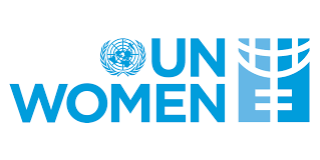
Poem by Khadija Rouf, from House Work, 8 March 2022
for Selma James
Why were women so angry with Selma James?
All she said was, imagine if housework were paid?
They say she burned with strange fever,
classy women rolled their eyes, when she spoke.
They dismissed her, this work done for love
somehow discounted, not seen as toil
but viewed as a role, accompanied by bluebirds
and a soprano, maybe a rainbow. But no pot of gold.
I’ll wager: if housework were noted, more women
could choose, and caring would have currency,
not be taken for granted – maybe men might respect
the share. And those with less wouldn’t need to clean
middle class houses ahead of their own. We hold half
of heaven. We could speak invoices, take time owing.
Stories in honor of International Women’s Day (new section)
Introduction by Marlena Plavšić
One of the best ways to learn about the intersection of psychology and human rights is through personal examples. The following interviews/comments from our colleagues help us all better understand how human rights issues can affect different aspects of our professional work.
Click on each contributor’s section to read the entire interivew
One Entity, Many Facets
Aimee Karam writes about #BreakTheBias and tells how a range of women experience gender-based discrimination in their professional lives.
She ends: all the above are examples of the inevitable need to reach “Gender equality today for a sustainable tomorrow”, to validate and recognize the contribution of women and girls around the world, the ones who are leading the battle for justice, equity and human rights.
Saima Eman impressed us with her deep involvement in advocating for human rights, especially related to women in Pakistan. She gave us a bit of a broader societal context before narrowing it down to her endeavours to empower women.
Maria Sabunaeva drew our attention with her recent experience of being cyberviolated in a pretty calm period of her (professional) life. She was doing her regular therapeutical work, having the peak of her social activism couple of years behind. While the intensity of the threats witness about the impact Maria’s work has obviously achieved, we condemn violence against her as well as against the psychological knowledge and services that we consider as standards. This is the story about a female psychologist who advocates for human rights, and whose human rights have been violated.
Katerina Paschou approached us during the Fundamental Rights Forum held in October 2021. She was curious about the Network and the options for cooperation. We talked about her work in the Greek Council for Refugees, especially about her involvement as a counselor in the European Project SARAH, which aims to protect and support migrant women who experience(d) gender-based violence. This interview is our attempt to shed more light on the topic.
CONTENT AREAS AND NEWS
Children/Youth
Childhood maltreatment and its role in the development of pain and psychopathology. Mariesa Cay and others, January 27, 2022, The Lancet.
Childhood maltreatment represents a form of trauma capable of altering fundamental neurobiological properties and negatively impacting neurodevelopmental processes. An outcome of childhood maltreatment is the emergence of psychopathology, which might become evident during childhood or adolescence, but might also project into adulthood. In this Review, we propose a biobehavioural framework in which childhood maltreatment and the associated aberrant neurobiological mechanisms and behavioural processes additionally lead to the onset of altered pain processing and, ultimately, the existence of pain syndromes.
Statement of APA president regarding call by Texas governor to ‘report’ parents of transgender children, Frank C. Worrell, APA, February 24, 2022
Following is a statement by Frank C. Worrell, PhD, president of the American Psychological Association, condemning a directive from Texas Gov. Greg Abbot calling on “licensed professionals” and “members of the general public” to report the parents of transgender minors to state authorities if it appears the minors are receiving gender-affirming medical care:
“This ill-conceived directive from the Texas governor will put at-risk children at even higher risk of anxiety, depression, self-harm, and suicide. Gender-affirming care promotes the health and well-being of transgender youth and is provided by medical and mental health professionals, based on well-established scientific research. The peer-reviewed research suggests that transgender children and youth who are treated with affirmation and receive evidence-based treatments tend to see improvements in their psychological well-being.
Climate Justice
Can international law offer protection to those at risk of climatic statelessness? Jo Venkov, Lawyer and Writer on statelessness, identity, citizenship and belonging, February 2022, ENS.
Scholarship on the impact of climate change on migration has tended to focus on refugee populations, but growing scholarship highlights the impending risks of statelessness for affected populations. What would happen if an entire state disappeared due to the effects of climate change? And what would be the citizenship status of its displaced inhabitants? Would this be the first instance of ‘climatic statelessness’? This piece presents key issues explored in more detail on the Torn Identity blog.
COVID-19
Tackling a “Shadow Pandemic” of Gender-Based Violence. Lama Khateeb, Open Society Foundations, January 21, 2022.
One might think that the COVID-19 pandemic would bring partners and families closer together, but global indicators on gender-based violence tell a far darker story. Domestic violence shot up exponentially around the world in 2020 and 2021, leading the United Nations to label it the “shadow pandemic.” Early findings from a global UN Women assessment suggest that gender-based violence has significantly increased because of COVID-19. Prior to the pandemic, the UN had estimated that one in three women worldwide experienced physical or sexual violence over the course of their lives, most often at the hands of an intimate partner—a bitter reality perpetuated by endemic power hierarchies and gender inequality. Further stress triggered by lockdowns, income loss, and social isolation during the pandemic pushed more men predisposed to violence to abuse—or intensify the abuse of—partners trapped with them behind closed doors.
Mariam Zemouri, president of the Israr Coalition—a Moroccan women’s rights network and partner of Open Society—says calls to the organization’s hotlines to report incidents of domestic violence spiked during lockdowns.
See new COVID-19 and health/human rights articles on the GNPHR website
Crimes against humanity
Panel Backs Transfer of Mentally Ill Guantánamo Detainee Suspected of 9/11 Role. Carol Rosenberg, Charlie Savage, February 4 2022, NY Times.
The case of a mentally ill detainee at Guantánamo Bay, Mohammed al-Qahtani, has long confounded the United States government. Suspected of being Al Qaeda’s intended 20th hijacker in the Sept. 11, 2001, attacks, he was tortured by military interrogators early in his detention at the American naval base in Cuba. A senior Pentagon official later determined that, because of how Mr. Qahtani was initially treated, he could not be prosecuted. Security officials also considered him too dangerous to release, so he has remained detained for two decades.
On Friday, the Pentagon said that a parole-like board had recommended repatriating Mr. Qahtani to Saudi Arabia to a custodial rehabilitation and mental health care program for extremists. The Biden administration is expected to send him there as early as March.
Data Rights
Artificial Intelligence & Human Rights: Friend or Foe? Alberto Quintavalla and Jeroen Temperman, Human Rights Here, 24 February 2022.
Artificial intelligence (‘AI’) applications can have a significant impact on human rights. This impact can be twofold. On the one hand, it may contribute to the advancement of human rights. A striking example is the use of machine learning in healthcare to improve precision medicine so that patients would receive better care. On the other hand, it can pose an obvious risk to the respect of human rights. Unfortunately, there are countless examples. Perhaps the most obvious one is the use of algorithms discriminating against ethnic minorities and women.
Automated Content Moderation, Hate Speech and Human Rights, Natalie Alkiviadou, Human Rights Here, November 2021.
Within the framework of a multi-stakeholder, cross-border, EU project entitled SHERPA ‘Shaping the Ethical Dimensions of Smart Information Systems (SIS)’, a project led by the University of De Montfort (UK), a deliverablewas developed on 11 specific challenges that SIS (the combination of artificial intelligence and big data analytics) raise with regards to human rights. This blog post seeks to focus on one of those challenges, namely ‘Democracy, Freedom of Thought, Control and Manipulation.’ This challenge considered, amongst others, the impact of SIS on freedom of expression, bias and discrimination.
Online harassment field manual. Online abuse poses an urgent and growing threat to free expression, equity and inclusion.
Whether you’re experiencing or witnessing online abuse, this Field Manual offers concrete strategies for how to defend yourself and others. We wrote this guidance with and for those disproportionately impacted by online abuse: writers, journalists, artists, and activists who identify as women, BIPOC, and/or LGBTQIA+. Whatever your identity or vocation, anyone active online will find useful tools and resources here for navigating online abuse and tightening digital safety.
Disability Rights
Persons with psychosocial disabilities in development programs: Insights on peer support for meaningful inclusion, January 2022.
In this Insights article, the OPD Engagement Officer in Kenya offers insights into support requirements for persons with psychosocial disabilities. In the first part she talks about identity, while in the second part, based on her experiences, she writes about peer support for persons with psychosocial disabilities to further their meaningful inclusion in society.
Human Rights Education
Addressing Hate Speech through Education. A Virtual panel discussion organized by UNESCO and USC Shoah Foundation on the topic of “How to counter antisemitism: the role of educators and education.” Felicia Tibbetts, GNPHR Advisory Board member, presented specific strategies that educators and school leaders can use to combat discrimination and hate speech. She highlighted that addressing hate speech does not mean limiting or prohibiting freedom of speech. It does mean keeping hate speech from escalating into something more dangerous, particularly incitement to discrimination, hostility, and violence, which is prohibited under international law.
On the International Day of Education (Jan 24), Amnesty International launched Rights Arcade, a free human rights game app which aims to educate the next generation of human rights defenders. The game is available on Google Play and the IOS store.
Inclusion, Exclusion, Racism
Martin Luther King, Jr.,’s History Lessons. Jelani Cobb, January 9, 2022 The New Yorker. “On March 25, 1965, at the conclusion of the brutally consequential march from Selma to Montgomery, Martin Luther King, Jr., delivered a speech titled “Our God Is Marching On!” He spoke to a crowd of twenty-five thousand people on the grounds of the Alabama state capitol, in view of the office window of the segregationist governor George Wallace. The address is not among King’s best-known, but it is among the most revelatory. King argued that, in the decade since the bus boycotts in that city, a new movement had emerged and an older order was starting to fall away. Referring to the historian C. Vann Woodward’s book “The Strange Career of Jim Crow,” King said that racial segregation had begun not simply as an expression of white supremacy but as a “political stratagem employed by the emerging Bourbon interests in the South to keep the southern masses divided and southern labor the cheapest in the land.” The so-called split-labor-market theory held that, by creating a hyper-exploited class of Black people, white élites could hold down the wages of white workers. And so racism didn’t just injure Black people, its immediate object; it took a toll on white laborers, too.
Winter Olympics: China stirs controversy with Uighur torchbearer. ALJAZEERA, 5 February 2022. China’s move to thrust a young Uighur athlete into the spotlight at the climax of the Beijing Winter Olympics opening ceremony has placed her at the centre of longtime controversy over rights abuses in Xinjiang. Dinigeer Yilamujiang, a 20-year-old cross-country skier, trained for years to fulfil every child’s dream to star at the Olympics. She is from the Uighur minority from the region of Xinjiang, where China’s ruling Communist Party is accused of widespread human rights abuses.
Following Yilamujiang’s appearance on television across the world, Chinese diplomats shared videos on Twitter of her family clapping as they watched the ceremony on screen, some dabbing tears from their eyes.
China has repeatedly exhorted its critics to stop “politicising” the Olympic Games, overshadowed by issues including human rights violations, COVID, and fears of what will happen to athletes if they speak out at the games.
Migration, Refugees, Displacement, Statelessness

The Refugee Mental Health Resource Network is a web-based listing of volunteer psychologists and mental health professionals. The Network’s mission is to connect mental health experts willing to offer their services pro-bono to non-profit agencies and organizations working with the growing population of refugees worldwide. For more information, visit our About page. Registration is open to Volunteers. We will include your information in the database to be utilized when agencies are looking for volunteers with specific skills. You will be able to edit your profile, and staff can make any changes as necessary. If you experience difficulty registering on the Volunteers page, please Contact us. Elizabeth Carll, PhD, Chair
Effective guardianship is key to better protect unaccompanied children. EU Agency for Fundamental Rights. Guardians are key to ensure children’s well-being and that their best interests are taken into account. But the EU and its Member States continue to face many challenges to provide for full and effective guardianship for unaccompanied children arriving in Europe, reveals the latest report from the EU Agency for Fundamental Rights (FRA).
“EU and international standards guarantee unequivocal support for unaccompanied children. Yet, the gap between theory and practice leaves many of these vulnerable children without the guardian they need,” says FRA Director Michael O’Flaherty. “EU countries should make guardianship systems more effective to ensure all children enjoy the support, services and protection which they are entitled to.”
INTERNATIONAL HUMAN RIGHTS NEWS
Ahmed Samir Santawy, Egypt, SCHOLARS AT RISK NETWORK
Mr. Ahmed Samir Santawy is a postgraduate student in Sociology and Social Anthropology at Central European University (CEU) in Vienna Austria, and an Egyptian citizen, who is detained in Egypt in apparent connection with his studies and alleged, nonviolent expressive activity. His studies focus on women’s rights in Egypt, in particular, reproductive rights.
On June 22, the State Security Emergency Misdemeanor Court sentenced Mr. Santawy to four years in prison and a fine of 500 pounds for publishing “false news.” The conviction is reportedly based on social media posts critical of Egypt’s violations of human rights, which Mr. Santawy has denied writing. Verdicts given by State Security Emergency Courts cannot be appealed.
On June 23, after the verdict, Mr. Santawy began a hunger strike. TAKE ACTION.
Boğaziçi University – Removal of Faculty
Scholars at Risk, has addressed an open letter to Turkey’s President and ruling Justice and Development Party (AKP) Chair Recep Tayyip Erdoğan, Council of Higher Education (YÖK) President Prof. Erol Özvar and appointed rector of Boğaziçi University Prof. Naci İnci. Penned by Robert Quinn, the Executive Director of Scholars at Risk, the letter of the network has urged the authorities in Turkey to “restore academic freedom and autonomy at Boğaziçi University“.
The call of Scholars at Risk came some two weeks after Prof. Özlem Berk Albachten, the Dean of the Faculty of Arts and Sciences, Prof. Metin Ercan, the Dean of the Faculty of Economics and Administrative Sciences, and Prof. Yasemin Bayyurt, the Dean of the Faculty of Education, were removed from office by the appointed rectorate upon the decision of the YÖK.
PUBLICATIONS
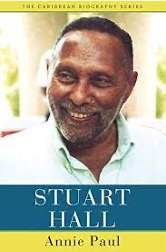 Stuart Hall | A conversation with Annie Paul and Darién J. Davis. The University of the West Indies press.
Stuart Hall | A conversation with Annie Paul and Darién J. Davis. The University of the West Indies press.
A pioneer in the field of cultural studies, Stuart Hall produced an impressive body of work on the relationship between culture and power. His contributions to critical theory and the study of politics, culture, communication, media, race, diaspora and postcolonialism made him one of the great public intellectuals of the late twentieth century. Annie Paul gives us an engaging introduction to a globally renowned Caribbean intellectual.
CONTACTS: Published by the Global Network of Psychologists for Human Rights – www.humanrightspsychology.org
Disclaimer: The website of the Global Network of Psychologists for Human Rights (GNPHR) contains articles, events and news about the domain where psychology and human rights intersect. The information presented in this Bulletin, does not imply that the GNPHR shares the views and beliefs in the articles.
- @GNPHR1
- How to get involved – read how you can contribute to the global network
- Consider contributing a Blog/Commentary
- News and Bulletins from the GNPHR – Subscribe to GNPHR
- Email addresses:

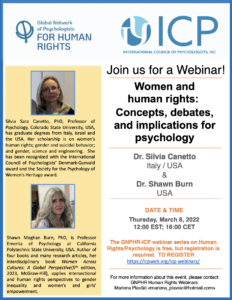
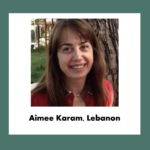



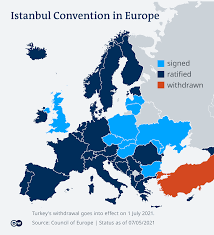 Istanbul Convention (Art.3) violence against women is “…all acts of gender-based violence that result in, or are likely to result in, physical, sexual, psychological or economic harm or suffering to women, including threats of such acts, coercion or arbitrary deprivation of liberty, whether occurring in public or in private life”.
Istanbul Convention (Art.3) violence against women is “…all acts of gender-based violence that result in, or are likely to result in, physical, sexual, psychological or economic harm or suffering to women, including threats of such acts, coercion or arbitrary deprivation of liberty, whether occurring in public or in private life”.